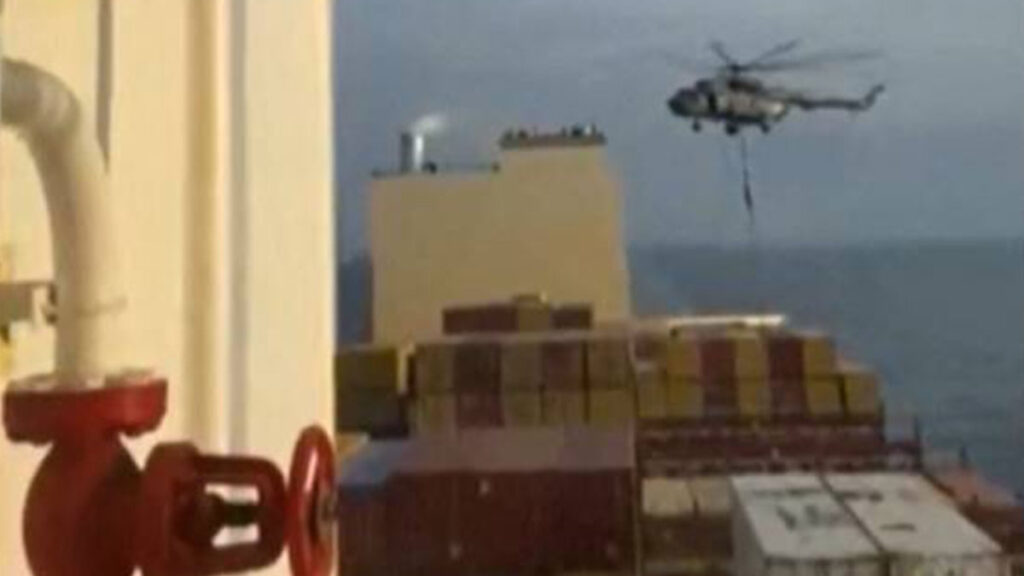
This image grab taken from a UGC video posted on social media on April 13, 2024 shows Iran’s Revolutionary Guards rappelling down onto a container ship named, MSC Aries, near the Strait of Hormuz. Iran’s Revolutionary Guards on Saturday seized a container ship “related to the Zionist regime (Israel) in the Gulf,” state media reported, as tensions soar in the region. AGENCE FRANCE-PRESSE
MANILA, Philippines — Philippine officials are working to free four Filipino crew members from the MSC Aries, a ship captured by Iran in the Strait of Hormuz.
The four Filipinos are part of the ship’s 25 crew, which also includes sailors from Russia, India, Pakistan, and Estonia, based on reports.
“No efforts will be spared to have them released and returned home as possible,” the Department of Foreign Affairs (DFA) said on Saturday.
READ: DFA: 10 of 18 Filipinos from seized oil tanker in Middle East back in PH
Booms and sirens in Israel after Iran launches over 200 missiles and drones in unprecedented attack
“Advancing the welfare of our seafarers and other overseas nationals is an ongoing commitment of the administration of President Marcos,” it said.
Hans Cacdac, officer in charge of the Department of Migrant Workers (DMW), said they have contacted the families of the seafarers and “assured them of full government support and assistance.”
He said the DMW is coordinating with the DFA, the licensed manning agency, ship manager and ship operator “to ensure the safety and well-being as well as work on the release of our dear seafarers.”
According to Western and Iranian news reports, the container ship MSC Aries was targeted by Iran for its Israeli links.
MSC leases the ship from Gortal Shipping, an affiliate of Zodiac Maritime that is controlled by Israeli businessman Eyal Ofer.
4th incident
This is the fourth incident of Filipinos being seized in waters of the Middle East.
The first was when the car carrier MV Galaxy Leader was seized last Nov. 19 in the Red Sea by Houthi rebels along with 17 Filipino crew members. The vessel and its crew remain in the custody of Houthi rebels.
The second incident involved the Iranian Navy’s seizure of the oil tanker MV Saint Nikolas along with 18 Filipino seafarers. Twelve of the 18 were repatriated early March, but six remain in Iranian custody, according to the DFA.
The third incident involved the bulk carrier MV True Confidence that had 13 Filipino crewmen. Two of the Filipinos, plus one Vietnamese crew, were killed in a Houthi missile attack in the Red Sea, the first fatalities in the ongoing Red Sea crisis.
READ: DMW: 18 OFWs in good situation after Iran seized tanker in Oman
‘Warlike zone’
In March, an international group of shipowners and operators officially labeled the Red Sea and Gulf of Aden as a “war-like zone.”
Filipino seafarers aboard vessels bound for war zones have the option to refuse sailing, with the company covering repatriation expenses and offering additional compensation equivalent to two months’ basic wage.
The “right to refuse” empowers Filipino seafarers navigating the Red Sea and Gulf of Aden to directly inform the DMW about their decision not to traverse these areas via an online portal.
During a recent virtual press briefing, Cacdac announced the development of an online registry where Filipino seafarers can declare their refusal to sail when they learn of their ships’ plans to navigate the Red Sea or the Gulf of Aden.
Onboard Filipino seafarers who may want to exercise their right to refuse service in a vessel that is sailing through “warlike zone,” such as the Red Sea and Gulf of Aden, can report directly to the DMW while they are at sea.
Hotlines
The DMW designated +63287221144 and +63287221155 as hotlines for such seafarers, in addition to the +6321348 One Repatriation Command Center.
Seafarers may also send pertinent documents to the DMW through email at sbhighrisk@dmw.gov.ph if they will sign the document, “confirmation of refusal to traverse the Red Sea or Gulf of Aden and/or other warlike and high-risk zone.”
The refusal document has to be submitted to the licensed manning agencies (LMAs) and the principal or employer.
“Allow seafarers to freely decide to refuse sailing in the said areas/zones without discrimination and prejudice to their present and future employment,” Cacdac ordered LMAs through Department Order No. 01 series of 2024 issued on March 30.
Cacdac required manning agencies to inform Filipino seafarers who are about to embark on voyages through warlike zones of their rights and entitlements should they consent to continue with their voyage, to help them make “informed decisions.”
“Ensure the immediate and safe repatriation of seafarers who will invoke their right to refuse sailing in said areas/zones,” Cacdac said.
He told LMAs to deem a “refusal to sail” as a “significant event” and report within 24 hours to the DMW’s sea-based accreditation bureau through email at sbhighrisk@dmw.gov.ph any refusal to sail.